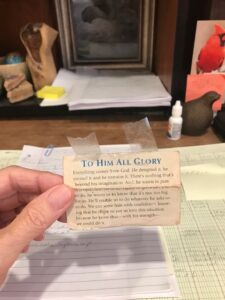 How much do I depend on God? Eyes closed. I’m snug and warm under the covers. The blanket edge flops over most of my face. On my cheek comes a velvety soft fluttering, a tap tap tap, tappity tap, tappity tap. Lily, my sweet cat, is waking me a bit early. I turn on my back and she climbs on my chest. Nothing happens, so she administers more tappity tapping. After a few ear rubs she jumps to the floor, but not for long. In thirty seconds, she again sits on my chest, tappity tapping my cheek.
How much do I depend on God? Eyes closed. I’m snug and warm under the covers. The blanket edge flops over most of my face. On my cheek comes a velvety soft fluttering, a tap tap tap, tappity tap, tappity tap. Lily, my sweet cat, is waking me a bit early. I turn on my back and she climbs on my chest. Nothing happens, so she administers more tappity tapping. After a few ear rubs she jumps to the floor, but not for long. In thirty seconds, she again sits on my chest, tappity tapping my cheek.
Then I was out of bed, heading to the bathroom, getting a drink of water, washing my face, getting dressed, walking to the kitchen, putting on water for tea. Through all of that, Lily was right there within three feet, looking at me with her beautiful eyes, intently watching my every move. The moment I reached for a can of cat food, she meowed and ran back to the bedroom, to sit in front of her two white feeding bowls. Focused and persistent she was.
Why? Lily needs me, for her very life. I am essential to her, a vital necessity. Without me, she has no food and no water.
Do I need God like I need breath? The Word is filled with verses where God tells us to seek Him with all our heart. In his farewell address before the Israelites entered the Promised Land, Moses warned that they would be scattered and many of them destroyed if they worshipped idols. But Moses told them that even from that place of idol worshipping they could still be saved if they sought God desperately. “But if from there you will seek (inquire for and require as necessity) the Lord your God, you will find Him if you [truly] seek Him with all your heart [and mind] and soul and life. (emphasis added, Deuteronomy 4:29, AMPC).
Lamentations 3:25 instructs us that “The Lord is good to those who wait hopefully and expectantly for Him, to those who seek Him [inquire of and for Him and require Him by right of necessity and on the authority of God’s word.] (AMPC, emphasis added)
This verse tells me that I am to wait for God with hope and expectation. It also tells me that my need gives me the right to ask God for help and that I can do so with confidence when my need is covered by the Word. And God promises to “supply all your needs from His glorious riches, which have been given to us in Christ Jesus.” (I Corinthians 4:19, NLT)
All I have to do is remember the many times God has come through for me and I can lean on God with confidence and trust Him while He works out my problems. Ponder Psalm 9:10.
And they who know Your name [who have experience and acquaintance with Your mercy] will lean on and confidently put their trust in You, for You, Lord, have not forsaken those who seek (inquire of and for) You [on the authority of God’s Word and the right of their necessity].
 Do you see that God is telling us again that we can ask for God’s help based on the authority of the Word of God and that our need gives us the right to ask?
Do you see that God is telling us again that we can ask for God’s help based on the authority of the Word of God and that our need gives us the right to ask?
Being desperate for God is a blessing. It is good when God lets be aware that we have, in some way, turned our face away from the light of His truth. I have a built-in safeguard in that regard because all kinds of negative feelings start if I let my mind drift.
Despite the miraculous healing God did of life-long depression, it is still sometimes a struggle to maintain emotional balance. Through many failures, many times repeating the lesson, I have learned that I need God as I need breath. I learned that if I do not keep my mind on God and His Word all day long, that the enemy’s destructive lies can quickly flood my mind with darkness. My fleshly tendency is to feel afraid, to worry, and to grumble and complain, about the little as well as big “troubles, trials, distresses and frustrations.” Jesus warned us we will have in this world (John 16:33)
 If I do not immediately reconnect with God and let the truth of His Word light the way for my next steps, I continue stumbling along in the dark, listening to the enemy’s taunts of doubt, fear, and hopelessness. With every step, it is harder to turn back to the light of God’s presence and the peace and joy He has stored up for me. My foot has been trapped in the snare.
If I do not immediately reconnect with God and let the truth of His Word light the way for my next steps, I continue stumbling along in the dark, listening to the enemy’s taunts of doubt, fear, and hopelessness. With every step, it is harder to turn back to the light of God’s presence and the peace and joy He has stored up for me. My foot has been trapped in the snare.
I wish I could say this never happens anymore, but it still does because the enemy of our souls, satan, is exceedingly evil and cunning and always seeking to steal, kill and destroy (John 10:10).
How has he attacked lately? Like many fellow believers, I have struggled with several health problems for many months now, praying and believing for healing and doing all I can to improve my health. However, despite a good diet, medicine, exercise, and physical therapy (with God’s hand evident in each of these), it has become progressively difficult to keep writing. Problems with my back, neck, eyes and hands, energy and mental clarity – the very things I need to write – have continued for months now, one new difficulty after the other.
What to do when hope dies. Somewhere along the path of the last few weeks, I failed to keep hope alive. Subconsciously, I began to doubt that God would be able to keep me writing. This was layered of course over other ongoing burdens, like unsaved loved ones, bills, repeated plumbing problems, and of course the darkness of our present world we all are facing. Every day, climbing out of the mire of negative thoughts grew harder. I grew irritable and short-tempered with traffic, neighbors and every little annoyance.
Fortunately, I kept seeking God, asking Him to guide me, show me what to do, and to restore my soul. I read and listened to Psalm 25 through Psalm 33 repeatedly. One morning I felt so desperate that I made repeating two passages of Scripture all day long my only goal.
Psalm 28:7 – The Lord is my Strength and my [impenetrable] Shield; my heart trusts in, relies on, and confidently leans on Him, and I am helped; therefore my heart greatly rejoices, and with my song will I praise Him.
Psalm 33:18-22 – Behold, the Lord’s eye is upon those who fear Him [who revere and worship Him with awe], who wait for Him and hope in His mercy and loving-kindness,
19 To deliver them from death and keep them alive in famine.20 Our inner selves wait [earnestly] for the Lord; He is our Help and our Shield.
21 For in Him does our heart rejoice, because we have trusted (relied on and been confident) in His holy name.
22 Let Your mercy and loving-kindness, O Lord, be upon us, in proportion to our waiting and hoping for You. (AMPC, emphasis added)
That day was, by grace, better and I kept persisting, being honest with God and leaning on Him for His strength because my strength was gone.
I must guard my expectations of how deliverance will come. I think I was expecting God to do as He has done countless times before, to open a passage of Scripture for me or let me hear a bit of music or catch sight of a bird or flower or hear an encouraging word and all of a sudden get my heart back in the right place.
 But this time, this time I think God was lovingly letting me develop more spiritual muscle. I have had to patiently plod along, one hard step at a time, one day after another, doing what I know to do, and reminding myself of all God’s previous deliverances (Psalm 107:43).
But this time, this time I think God was lovingly letting me develop more spiritual muscle. I have had to patiently plod along, one hard step at a time, one day after another, doing what I know to do, and reminding myself of all God’s previous deliverances (Psalm 107:43).
The following three passages of Scripture especially helped.
Philippians 4:4-7 – “wonder-working power.”
Rejoice in the Lord always [delight, gladden yourselves in Him]; again I say, Rejoice!
5 Let all men know and perceive and recognize your unselfishness (your considerateness, your forbearing spirit). The Lord is near [He is coming soon].
6 Do not fret or have any anxiety about anything, but in every circumstance and in everything, by prayer and petition (definite requests), with thanksgiving, continue to make your wants known to God.
7 And God’s peace [shall be yours, that tranquil state of a soul assured of its salvation through Christ, and so fearing nothing from God and being content with its earthly lot of whatever sort that is, that peace] which transcends all understanding shall garrison and mount guard over your hearts and minds in Christ Jesus. (AMPC)
This verse tells me to:
- choose to be glad in the Lord,
- think how to help others, and,
- rather than upsetting myself with worry, to ask God specifically for what I need in every situation and to thank Him.
If I do that, He promises to keep me in peace and guard my heart. He will build a permanent fortress around my heart. That’s how carefully He will protect my heart.
Jeremiah 15:19 – blessedly firm conviction about doubting God.
Therefore thus says the Lord [to Jeremiah]: If you return [and give up this mistaken tone of distrust and despair], then I will give you again a settled place of quiet and safety, and you will be My minister;
and if you separate the precious from the vile [cleansing your own heart from unworthy and unwarranted suspicions concerning God’s faithfulness], you shall be My mouthpiece. (AMPC, emphasis added)
As He told Jeremiah, God clearly tells me that if I return to trust and hoping in Him that He will give me “again a settled place of quiet and safety” and I can go about my work of living for and serving God. Furthermore, the Lord clearly tells me that it is a vile thing to have “unworthy and unwarranted suspicions concerning God’s faithfulness.” He is lovingly but firmly rebuking me for doubting Him, just as the Israelites did in the wilderness over and over, despite all the times God had forgiven and rescued them. But the verse also shows me that it is precious to God when I trust Him and have faith in His faithfulness.
Habakkuk 3:17-19 – renewed hope and strength.
17 Though the fig tree does not blossom and there is no fruit on the vines, [though] the product of the olive fails and the fields yield no food, though the flock is cut off from the fold and there are no cattle in the stalls,
18 Yet I will rejoice in the Lord; I will exult in the [victorious] God of my salvation!
19 The Lord God is my Strength, my personal bravery, and my invincible army; He makes my feet like hinds’ feet and will make me to walk [not to stand still in terror, but to walk] and make [spiritual] progress upon my high places [of trouble, suffering, or responsibility]!
The example of the prophet Habakkuk is a model of the right attitude to have while living in desperate times. Habakkuk said that no matter how hopeless circumstances look (v. 17) we can choose to be exceedingly glad in the Lord and to have an attitude of victory. Why? Because God IS our strength, God IS our bravery when we have none, and He IS our army that can never, never, no never be defeated. When we are weak and afraid, God Himself will be strong and brave in us. He Himself will fight our battles.
 Despite all life’s troubles, sufferings, and responsibilities, God gives us the ability to walk right through them all and to make spiritual progress because of and on top of the very troubles themselves. Just like a mountain goat moves forward in its daily travels across rugged terrain.
Despite all life’s troubles, sufferings, and responsibilities, God gives us the ability to walk right through them all and to make spiritual progress because of and on top of the very troubles themselves. Just like a mountain goat moves forward in its daily travels across rugged terrain.
What are your troubles? Dear friend, on the authority of God’s Word I can tell you that if you are seeking God, He is right there with you (2 Chronicles 15:2). Your life may seem small and insignificant, like my quiet, retiree’s life does, and troubles may have nearly swamped your little boat, but the God Who made and controls the entire world loves you and His compassion for you is as high as the heavens are above the earth (Psalm 103).
He understands exactly what you are going through, He feels it with you, and He has prepared a way ahead of time for you to escape into His place of safety and peace and, yes, even rejoicing.
The temptations in your life are no different from what others experience. And God is faithful. He will not allow the temptation to be more than you can stand. When you are tempted, He will show you a way out so that you can endure. (I Corinthians 10:13, NLT, emphasis added.)
All that you have I have to do is wait, with confident expectation and loving obedience, on our all-mighty, forever loving God. He will renew your strength.
 28 Have you not known? Have you not heard? The everlasting God, the Lord, the Creator of the ends of the earth, does not faint or grow weary; there is no searching of His understanding.
28 Have you not known? Have you not heard? The everlasting God, the Lord, the Creator of the ends of the earth, does not faint or grow weary; there is no searching of His understanding.
29 He gives power to the faint and weary, and to him who has no might He increases strength [causing it to multiply and making it to abound].
30 Even youths shall faint and be weary, and [selected] young men shall feebly stumble and fall exhausted;
31 But those who wait for the Lord [who expect, look for, and hope in Him] shall change and renew their strength and power; they shall lift their wings and mount up [close to God] as eagles [mount up to the sun]; they shall run and not be weary, they shall walk and not faint or become tired (Isaiah 40:28-31, AMPC, emphasis added).
Did things get better? Outward circumstances have changed little but, by grace, I have a grip again (which is to say I have a grip on God’s hand. He never, no never, no never for one second let go of me). And you know, while I was writing this blog post for you, on a gray cloudy day, I felt the warmth of His touch on my heart again, after many days. As the song says, “Oh, how He loves you, oh how He loves me, oh how He loves you and me.”

 His love gifts are everywhere. Predawn coolness filled the room. I closed my eyes, relishing the feel of it on the bare skin of my arms. I pressed my palms around the mug of tea just the right temperature for sipping. Inhaling the cool air deep into my lungs, I put the tea on the window ledge and picked up the pencil, ready to continue my journaling with the Lord. My eyes paused, finally, on the profusion of pink roses swaying just outside my window. That’s when conviction came, that piercing within as you realize you have hurt someone you love most dearly,
His love gifts are everywhere. Predawn coolness filled the room. I closed my eyes, relishing the feel of it on the bare skin of my arms. I pressed my palms around the mug of tea just the right temperature for sipping. Inhaling the cool air deep into my lungs, I put the tea on the window ledge and picked up the pencil, ready to continue my journaling with the Lord. My eyes paused, finally, on the profusion of pink roses swaying just outside my window. That’s when conviction came, that piercing within as you realize you have hurt someone you love most dearly, How often do I take His specially chosen love gifts for granted? That morning, I counted 22 roses in bloom or in bud. When had I begun taking this precious gift from God for granted? How would a human husband feel if his wife plunked the carefully chosen bouquet of her favorite flowers in a corner and never looked at them again? How many times the past few weeks since the roses began blooming had God nudged me to stop and sit down with Him and just thank Him, to just spend a few minutes specifically thanking Him for those roses?
How often do I take His specially chosen love gifts for granted? That morning, I counted 22 roses in bloom or in bud. When had I begun taking this precious gift from God for granted? How would a human husband feel if his wife plunked the carefully chosen bouquet of her favorite flowers in a corner and never looked at them again? How many times the past few weeks since the roses began blooming had God nudged me to stop and sit down with Him and just thank Him, to just spend a few minutes specifically thanking Him for those roses? Why do we become ungrateful? We get distracted by many things, our own desires, someone else’s agenda, and the ways of this dark world. This world is filled with “troubles, trials, distress and frustrations.” Just before Calvary, Jesus lovingly told His disciples that they would have “troubles, trials, distress and frustration” in this world. But He also told them “but be of good cheer [take courage; be confident, certain, undaunted]! For I have overcome the world. [I have deprived it of power to harm you and have conquered it for you.] (John 16:33b, AMPC, emphasis added)
Why do we become ungrateful? We get distracted by many things, our own desires, someone else’s agenda, and the ways of this dark world. This world is filled with “troubles, trials, distress and frustrations.” Just before Calvary, Jesus lovingly told His disciples that they would have “troubles, trials, distress and frustration” in this world. But He also told them “but be of good cheer [take courage; be confident, certain, undaunted]! For I have overcome the world. [I have deprived it of power to harm you and have conquered it for you.] (John 16:33b, AMPC, emphasis added)
 Stained, again. “Oh, no! Not again!”
Stained, again. “Oh, no! Not again!”:max_bytes(150000):strip_icc()/reasons-to-use-hydrogen-peroxide-2145991-02-49046855b56b4b7898eede692f128f48.jpg) Getting those stains out. So what happened to my favorite everyday top? I remembered a household tip learned when I was a secretary for the Sheriff’s Office. Once when a deputy—wearing a snowy white uniform shirt—was fixing a jammed stapler he somehow got blood on his sleeve. Another deputy retrieved hydrogen peroxide from the clinic, poured a bit on each spot and rubbed. As she kept rubbing the liquid into the fabric, the hydrogen peroxide foamed away the blood stain. Completely.
Getting those stains out. So what happened to my favorite everyday top? I remembered a household tip learned when I was a secretary for the Sheriff’s Office. Once when a deputy—wearing a snowy white uniform shirt—was fixing a jammed stapler he somehow got blood on his sleeve. Another deputy retrieved hydrogen peroxide from the clinic, poured a bit on each spot and rubbed. As she kept rubbing the liquid into the fabric, the hydrogen peroxide foamed away the blood stain. Completely. [3] It is best to confess our sin immediately. Perhaps you have heard “It is best to keep short accounts with the Lord.” This pearl of wisdom comes from the Word. Leviticus 5:5 tells us “When you become aware of your guilt in any of these ways, you must confess your sin.” (NLT) Psalm 32:3 shows what happens when we refuse to confess our sin. “When I refused to confess my sin, my body wasted away, and I groaned all day long.”(NLT)
[3] It is best to confess our sin immediately. Perhaps you have heard “It is best to keep short accounts with the Lord.” This pearl of wisdom comes from the Word. Leviticus 5:5 tells us “When you become aware of your guilt in any of these ways, you must confess your sin.” (NLT) Psalm 32:3 shows what happens when we refuse to confess our sin. “When I refused to confess my sin, my body wasted away, and I groaned all day long.”(NLT) 
 Review of Part One: In Part One, we looked at the first three verses of the first chapter of Second Peter. We learned that, through having a personal relationship with Jesus, God has already provided everything we need for life and for that life to be godly. In Part Two, we see how He does that and how we are to respond.
Review of Part One: In Part One, we looked at the first three verses of the first chapter of Second Peter. We learned that, through having a personal relationship with Jesus, God has already provided everything we need for life and for that life to be godly. In Part Two, we see how He does that and how we are to respond.



 Key point: It is just as important to live a holy life today as it was for believers sixty years or so after the death of Jesus, when this book of the Bible was written. The way to live a holy life remains the same. Furthermore, verse 9 contains the clear warning: if we do not have the qualities listed in verses 4 through 7, we are short-sighted spiritually and have forgotten what Jesus has done for us. But if we develop those qualities, we “will never fall. . . and will receive a rich welcome into the eternal kingdom of our Lord and Savior Jesus Christ.” (v. 10-11, NIV)
Key point: It is just as important to live a holy life today as it was for believers sixty years or so after the death of Jesus, when this book of the Bible was written. The way to live a holy life remains the same. Furthermore, verse 9 contains the clear warning: if we do not have the qualities listed in verses 4 through 7, we are short-sighted spiritually and have forgotten what Jesus has done for us. But if we develop those qualities, we “will never fall. . . and will receive a rich welcome into the eternal kingdom of our Lord and Savior Jesus Christ.” (v. 10-11, NIV) In other words, God has put abundant grace and peace and total provision for a godly life in the pathway of knowing Jesus, of being one with Him. And knowing Jesus means knowing Him “fully, personally, precisely, and correctly.”
In other words, God has put abundant grace and peace and total provision for a godly life in the pathway of knowing Jesus, of being one with Him. And knowing Jesus means knowing Him “fully, personally, precisely, and correctly.”
 God, in His divine power, has already bestowed, or given, us everything we need for our life and for that life to be godly. Bestow means to give something to someone or present it to them. A queen could bestow knighthood on a man but if that man did nothing with it, what then? You can place a bowl of food in front of someone, but if they do not eat, what good does your bestowing food on them do?
God, in His divine power, has already bestowed, or given, us everything we need for our life and for that life to be godly. Bestow means to give something to someone or present it to them. A queen could bestow knighthood on a man but if that man did nothing with it, what then? You can place a bowl of food in front of someone, but if they do not eat, what good does your bestowing food on them do? A question to ponder: God has given animals, including my Lily cat, the means to take care of themselves. What would happen if Lily did not eat the food I put in her dish, or if she did not groom herself? Please show me, my beloved Heavenly Father, how to perceive and fully use all that You have bestowed upon me for living a life pleasing to You. Amen.
A question to ponder: God has given animals, including my Lily cat, the means to take care of themselves. What would happen if Lily did not eat the food I put in her dish, or if she did not groom herself? Please show me, my beloved Heavenly Father, how to perceive and fully use all that You have bestowed upon me for living a life pleasing to You. Amen. Do you see that God is telling us again that we can ask for God’s help based on the authority of the Word of God and that our need gives us the right to ask?
Do you see that God is telling us again that we can ask for God’s help based on the authority of the Word of God and that our need gives us the right to ask? If I do not immediately reconnect with God and let the truth of His Word light the way for my next steps, I continue stumbling along in the dark, listening to the enemy’s taunts of doubt, fear, and hopelessness. With every step, it is harder to turn back to the light of God’s presence and the peace and joy He has stored up for me. My foot has been trapped in the snare.
If I do not immediately reconnect with God and let the truth of His Word light the way for my next steps, I continue stumbling along in the dark, listening to the enemy’s taunts of doubt, fear, and hopelessness. With every step, it is harder to turn back to the light of God’s presence and the peace and joy He has stored up for me. My foot has been trapped in the snare. But this time, this time I think God was lovingly letting me develop more spiritual muscle. I have had to patiently plod along, one hard step at a time, one day after another, doing what I know to do, and reminding myself of all God’s previous deliverances (Psalm 107:43).
But this time, this time I think God was lovingly letting me develop more spiritual muscle. I have had to patiently plod along, one hard step at a time, one day after another, doing what I know to do, and reminding myself of all God’s previous deliverances (Psalm 107:43). Despite all life’s troubles, sufferings, and responsibilities, God gives us the ability to walk right through them all and to make spiritual progress because of and on top of the very troubles themselves. Just like a mountain goat moves forward in its daily travels across rugged terrain.
Despite all life’s troubles, sufferings, and responsibilities, God gives us the ability to walk right through them all and to make spiritual progress because of and on top of the very troubles themselves. Just like a mountain goat moves forward in its daily travels across rugged terrain.


 I finally heard what God was saying. As I paused and just rested with God, I finally understood what I think God was saying to me through circumstances. I think God was reminding me that I had dedicated my life and my work to God and that I am doing all I can for Him, the best I can, so I can know that He IS indeed leading my steps. Furthermore, far from condemning my weaknesses, such as a tendency to dread hard things and to fret, God feels great compassion toward me and He will help me with my specific weaknesses , just as a father watches and knows just when his toddler needs to be picked up and carried.
I finally heard what God was saying. As I paused and just rested with God, I finally understood what I think God was saying to me through circumstances. I think God was reminding me that I had dedicated my life and my work to God and that I am doing all I can for Him, the best I can, so I can know that He IS indeed leading my steps. Furthermore, far from condemning my weaknesses, such as a tendency to dread hard things and to fret, God feels great compassion toward me and He will help me with my specific weaknesses , just as a father watches and knows just when his toddler needs to be picked up and carried. “The trouble with life is that it is so daily.” (Chuck Swindoll) I must remind myself often that the everyday tasks of daily life—making breakfast, fetching home the groceries, housecleaning, paying bills, getting the car repaired—are as much a part of my life for God as when I am privileged to be seated at my desk writing. I must remember that God cares about the minutes and hours of the activities of my daily living as much as when I am doing something specifically for Him.
“The trouble with life is that it is so daily.” (Chuck Swindoll) I must remind myself often that the everyday tasks of daily life—making breakfast, fetching home the groceries, housecleaning, paying bills, getting the car repaired—are as much a part of my life for God as when I am privileged to be seated at my desk writing. I must remember that God cares about the minutes and hours of the activities of my daily living as much as when I am doing something specifically for Him.

 This Artic blast did not surprise God. This current Artic blast has brought dangerously cold temperatures to much of the United States, including Texas. In situations that could cause fear, it is comforting to remember God’s omnipotence. Just do a search on your computer for “Scriptures about God’s omnipotence.” I also love to review Chapters 38 through 41 in the book of Job. Notice especially Job 38:22-23, when God asks Job:
This Artic blast did not surprise God. This current Artic blast has brought dangerously cold temperatures to much of the United States, including Texas. In situations that could cause fear, it is comforting to remember God’s omnipotence. Just do a search on your computer for “Scriptures about God’s omnipotence.” I also love to review Chapters 38 through 41 in the book of Job. Notice especially Job 38:22-23, when God asks Job: Pray for our dams and waterways. Also on the same Flashpoint podcast, Dutch Sheets shared the need to pray for protection of our dams and waterways from terrorists. Curiously, Facebook declined to post Dutch’s “GiveHim15” podcast, but you can see Dutch’s comments at about minute 38 of the January 16 Flashpoint podcast, as well as on Rumble.
Pray for our dams and waterways. Also on the same Flashpoint podcast, Dutch Sheets shared the need to pray for protection of our dams and waterways from terrorists. Curiously, Facebook declined to post Dutch’s “GiveHim15” podcast, but you can see Dutch’s comments at about minute 38 of the January 16 Flashpoint podcast, as well as on Rumble.
 An important prayer for Israel. The military arm of Israel, the Israel Defense Force, needs our daily prayer. In 2005, I was privileged to visit the Holy Land. While there, I learned the powerful prayer below. Will you join me now in praying for the IDF?
An important prayer for Israel. The military arm of Israel, the Israel Defense Force, needs our daily prayer. In 2005, I was privileged to visit the Holy Land. While there, I learned the powerful prayer below. Will you join me now in praying for the IDF?
